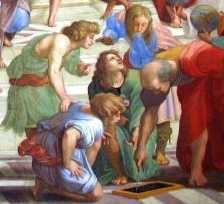No mp3 (yet) today. But if you wish to sing it, use the same tune as yesterday's hymn. Update: here is the mp3.
Summae Deus cleméntiae
God of greatest compassion
mundíque factor máchinae,
Maker of the whole scheme of the universe,
qui trinus almo númine
who, nurturing triune Deity
unúsque fírmas ómnia,
is also One, Thou establish all things,
Great God of boundless mercy hear;
Thou Ruler of this earthly sphere;
in substance one, in Persons three,
dread Trinity in Unity!
2. Nostros piis cum cánticis
Our holy songs with
fletus benígne súscipe,
tears graciously accept,
quo corde puro sórdibus
that with a heart clean of sin
te perfruámur lárgius.
we may enjoy Thee more abundantly.
2. Do Thou in love accept our lays
of mingled penitence and praise;
and set our hearts from error free,
more fully to rejoice in Thee.
3. Lumbos adúre cóngruis
Burn our loins with suitable (holy)
tu caritátis ígnibus,
flames of Thy charity
accíncti ut adsint pérpetim
that they may be continually girded
tuísque prompti advéntibus,
and ready for Thy appearance,
3. Our reins and hearts in pity heal,
and with Thy chastening fire anneal;
gird Thou our loins, each passion quell,
and every harmful lust expel.
4. Ut, quique horas nóctium
That, whatever hours of the night
nunc concinéndo rúmpimus,
we now interrupt with our singing
donis beátæ pátriæ
by gifts of the blessed fatherland
ditémur omnes áffatim.
may we all be amply enriched.
4. Now as our anthems, upward borne,
awake the silence of the morn,
enrich us with Thy gifts of grace,
from heaven, Thy blissful dwelling place!
5. Præsta, Pater piíssime,
Patríque compar Unice,
cum Spíritu Paráclito
regnans per omne saéculum. Amen.
5. Hear Thou our prayer, Almighty King;
hear Thou our praises, while we sing,
adoring with the heavenly host
the Father, Son and Holy Ghost.
Author of this 7th century hymn is unknown. English translation by John David Chambers (1805-1893).
Lentini's "title": Purification of the spirit
At the beginning of verse 2, Lentini modified the original word pius to become piis. "...a concept that would recur with the following benigne; therefore I prefer the reading of the Carmelite Breviary (Breviarium Fratrum... de Monte Carmelo, 1938), which attatches the piis to the cánticis, with the sense modified." In other words, it is simpler to figure out what pius means if you change it to piis, and since there is a precedent for this reading printed in a well-known Breviary, let's change it!
Britt, working with pius, goes through much explanation of how you have to supply Parens or Deus. This is much more complicated to interpret.
Verse 4 has been much changed. I have two different former versions, one from Britt...
Lumbos, iecurque morbidum
Our reins and our depraved hearts
Flammis adure congruis,
burn Thou with becoming (holy) flames,
Accincti ut artus excubent
that our well-girded limbs may watch
Luxu remoto pessimo.
far-removed from baneful luxury.
...and one from Lentini:
Lumbos iecurque morbidum
Our diseased loins(seat of sexuality) and liver(seat of feelings)
adure igni congruo,
burn Thou with becoming fire,
accincti ut sint perpetim
that they(our loins) be girded continually
luxu remoto pessimo
removed from the worst excesses
Lentini says that these are "terms and concepts that today annoy or clash (urtano) in a liturgical hymn." Wow. Is he saying that this kind of earthy language is not fit for polite company? That hymns which make reference to reining in our sexual impulses with the help of the Holy Spirit's fire of holiness are too jarring for mixed congregations? Perhaps he is right. But I think I prefer the prayer of the older Latin hymn. I think Lentini's "solution" is very Scriptural (using images from Holy Scripture, especially the gospel passages about girding our loins) but omits the part about leaving behind luxu pessimo (the worst excesses.)
What do you think?
Saturday, July 19, 2008
Subscribe to:
Post Comments (Atom)

No comments:
Post a Comment